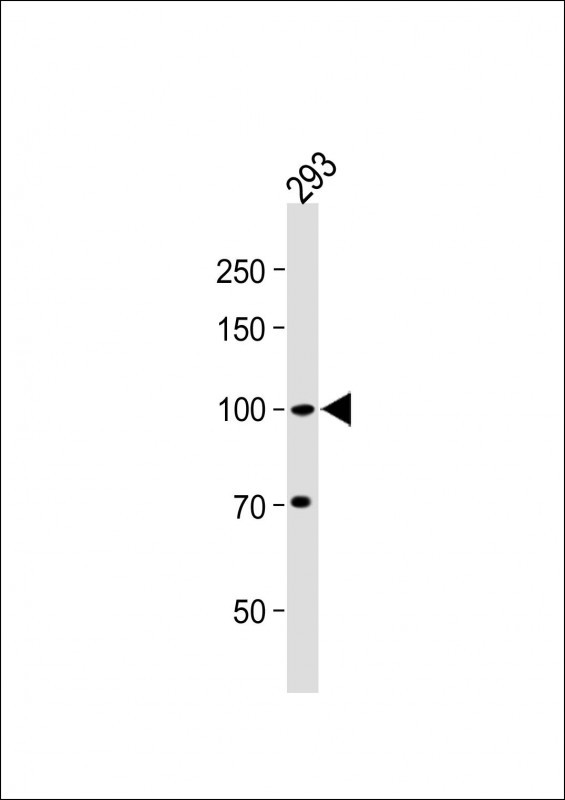
| WB | 咨询技术 | Human,Mouse,Rat |
| IF | 咨询技术 | Human,Mouse,Rat |
| IHC | 咨询技术 | Human,Mouse,Rat |
| ICC | 技术咨询 | Human,Mouse,Rat |
| FCM | 咨询技术 | Human,Mouse,Rat |
| Elisa | 咨询技术 | Human,Mouse,Rat |
| Aliases | Serine/threonine-protein kinase N3, Protein kinase PKN-beta, Protein-kinase C-related kinase 3, PKN3, PKNBETA |
| Entrez GeneID | 29941 |
| WB Predicted band size | 99.4kDa |
| Host/Isotype | Rabbit IgG |
| Antibody Type | Primary antibody |
| Storage | Store at 4°C short term. Aliquot and store at -20°C long term. Avoid freeze/thaw cycles. |
| Species Reactivity | Human |
| Immunogen | This PKN beta antibody is generated from rabbits immunized with a KLH conjugated synthetic peptide between 463-492 amino acids from the C-terminal region of human PKN beta. |
| Formulation | Purified antibody in PBS with 0.05% sodium azide,1%BSA and 50% glycerol.prepared by Saturated Ammonium Sulfate (SAS) . |
+ +
以下是关于PKNβ抗体的参考文献示例(注:以下内容为示例性概括,实际文献需通过学术数据库查询):
---
1. **文献名称**:*PKNβ regulates cell polarity and migration by modulating microtubule dynamics*
**作者**:Yamaguchi Y, et al.
**摘要**:本研究通过特异性PKNβ抗体进行免疫荧光和Western blot分析,发现PKNβ通过磷酸化微管相关蛋白调控细胞极性和迁移,为癌症转移机制提供了新见解。
2. **文献名称**:*Development of a high-affinity monoclonal antibody for PKNβ and its application in glioblastoma detection*
**作者**:Chen L, et al.
**摘要**:研究者开发了一种高特异性抗PKNβ单克隆抗体,并验证其在胶质母细胞瘤组织中的诊断潜力,证实PKNβ表达与肿瘤恶性程度正相关。
3. **文献名称**:*PKNβ interacts with mTORC2 to promote cell survival under oxidative stress*
**作者**:Kumar S, et al.
**摘要**:利用PKNβ抗体进行免疫共沉淀实验,揭示了PKNβ与mTORC2复合物的相互作用,表明其在氧化应激下通过激活AKT信号通路维持细胞存活。
4. **文献名称**:*PKNβ knockout mice exhibit impaired cardiac hypertrophy signaling*
**作者**:Rodriguez P, et al.
**摘要**:通过PKNβ抗体检测基因敲除小鼠模型,发现PKNβ缺失会抑制心肌肥厚相关信号通路(如NF-κB),提示其在心脏病理重塑中的关键作用。
---
如需具体文献,建议通过PubMed或Google Scholar检索关键词“PKNβ antibody”或“Protein kinase N beta antibody”获取最新研究。
PKN beta (Protein Kinase N beta), also known as PRK2 or PKN2. is a serine/threonine kinase belonging to the AGC kinase superfamily. It shares structural homology with PKC (protein kinase C) and contains an N-terminal regulatory domain with three antiparallel coiled-coil motifs and a C-terminal catalytic domain. PKN beta is activated by Rho GTPases (e.g., RhoA, Rac1) through direct interaction with its regulatory domain, linking it to cytoskeletal reorganization, cell migration, and stress fiber formation. It plays roles in diverse cellular processes, including proliferation, apoptosis, and vesicle trafficking, and is implicated in cancer progression, neurodegenerative diseases, and metabolic regulation.
PKN beta antibodies are essential tools for studying its expression, localization, and function. They enable detection of endogenous PKN beta via techniques like Western blotting, immunoprecipitation, and immunofluorescence. Commercially available antibodies often target specific regions, such as the N-terminal regulatory domain or C-terminal catalytic domain. Validation includes testing in knockout cell lines or siRNA-mediated knockdown to confirm specificity. Dysregulation of PKN beta has been observed in cancers (e.g., breast, prostate) and neurological disorders, making its antibodies valuable for biomarker studies and therapeutic target validation. Researchers also use phospho-specific antibodies to study activation-dependent phosphorylation sites (e.g., Thr816/Thr820), providing insights into kinase activity under physiological or pathological conditions.
×